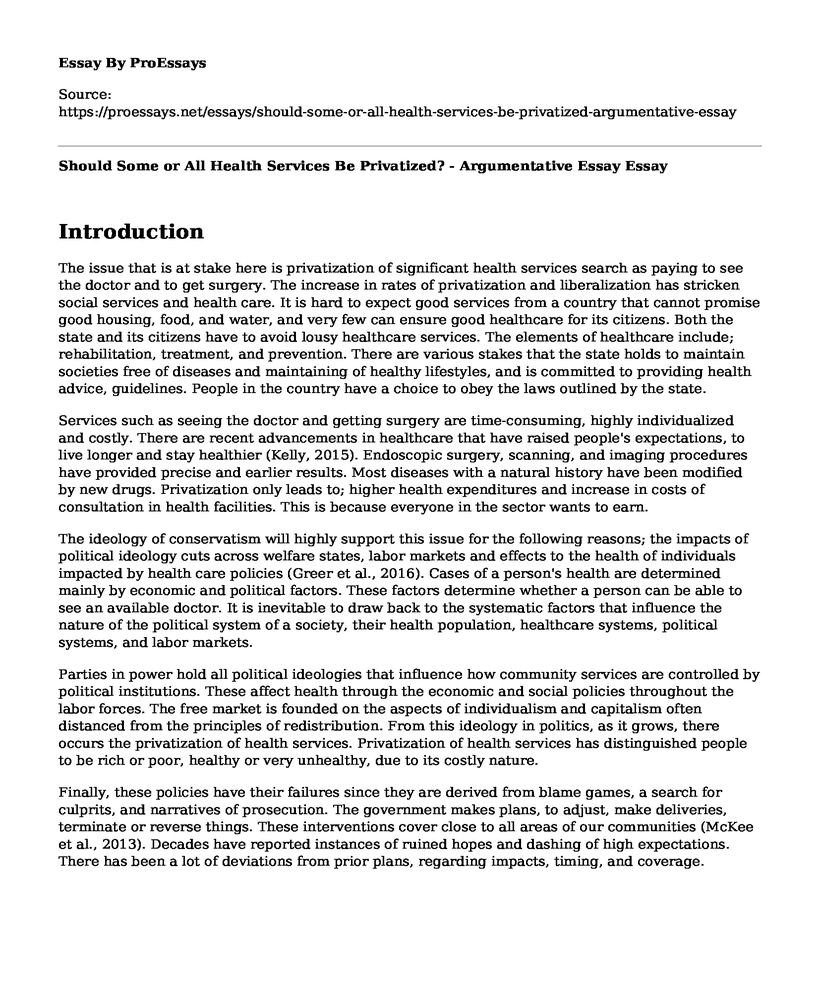Introduction
The issue that is at stake here is privatization of significant health services search as paying to see the doctor and to get surgery. The increase in rates of privatization and liberalization has stricken social services and health care. It is hard to expect good services from a country that cannot promise good housing, food, and water, and very few can ensure good healthcare for its citizens. Both the state and its citizens have to avoid lousy healthcare services. The elements of healthcare include; rehabilitation, treatment, and prevention. There are various stakes that the state holds to maintain societies free of diseases and maintaining of healthy lifestyles, and is committed to providing health advice, guidelines. People in the country have a choice to obey the laws outlined by the state.
Services such as seeing the doctor and getting surgery are time-consuming, highly individualized and costly. There are recent advancements in healthcare that have raised people's expectations, to live longer and stay healthier (Kelly, 2015). Endoscopic surgery, scanning, and imaging procedures have provided precise and earlier results. Most diseases with a natural history have been modified by new drugs. Privatization only leads to; higher health expenditures and increase in costs of consultation in health facilities. This is because everyone in the sector wants to earn.
The ideology of conservatism will highly support this issue for the following reasons; the impacts of political ideology cuts across welfare states, labor markets and effects to the health of individuals impacted by health care policies (Greer et al., 2016). Cases of a person's health are determined mainly by economic and political factors. These factors determine whether a person can be able to see an available doctor. It is inevitable to draw back to the systematic factors that influence the nature of the political system of a society, their health population, healthcare systems, political systems, and labor markets.
Parties in power hold all political ideologies that influence how community services are controlled by political institutions. These affect health through the economic and social policies throughout the labor forces. The free market is founded on the aspects of individualism and capitalism often distanced from the principles of redistribution. From this ideology in politics, as it grows, there occurs the privatization of health services. Privatization of health services has distinguished people to be rich or poor, healthy or very unhealthy, due to its costly nature.
Finally, these policies have their failures since they are derived from blame games, a search for culprits, and narratives of prosecution. The government makes plans, to adjust, make deliveries, terminate or reverse things. These interventions cover close to all areas of our communities (McKee et al., 2013). Decades have reported instances of ruined hopes and dashing of high expectations. There has been a lot of deviations from prior plans, regarding impacts, timing, and coverage.
Conclusion
Most people have judged performance in health care services to be biased and imperfect in the assessment of policy outcomes. They are afraid of the government and will, therefore, most times not mention apparent failures which went wrong. When studying policies, it is more important to focus more on reputation rather than failures, acknowledging that there are significant differences between both. The dimension of reputation looks at; outcomes, costs observed benefits, social balance, and original intentions.
References
Greer, S. L., Wismar, M., Figueras, J., & Vasev, N. (2016). Policy lessons for health governance. Strengthening Health System Governance, 105.
Kelly, A. (2015). The enterprise culture and the welfare state: restructuring the management of the health and personal social services. In Deciphering the Enterprise Culture (Routledge Revivals) (pp. 146-171). Routledge.
McKee, M., Balabanova, D., Basu, S., Ricciardi, W., & Stuckler, D. (2013). Universal health coverage: a quest for all countries but under threat in some. Value in Health, 16(1), S39-S45.
Cite this page
Should Some or All Health Services Be Privatized? - Argumentative Essay. (2022, Aug 15). Retrieved from https://proessays.net/essays/should-some-or-all-health-services-be-privatized-argumentative-essay
If you are the original author of this essay and no longer wish to have it published on the ProEssays website, please click below to request its removal:
- Argumentative Essay on Marijuana Legalization
- Paper Example on Nursing Informatics Competencies
- Research Paper on Educational and Professional Goals and the DNP Degree
- Paper Example on Organ Transplantation
- Essay Sample on How I See Myself Contributing to the Nursing Profession
- Nurse-Patient Affair: The 5-Phase Nursing Care Process - Essay Sample
- Essay Sample on Achieving Good Health: Essential for All Nations







